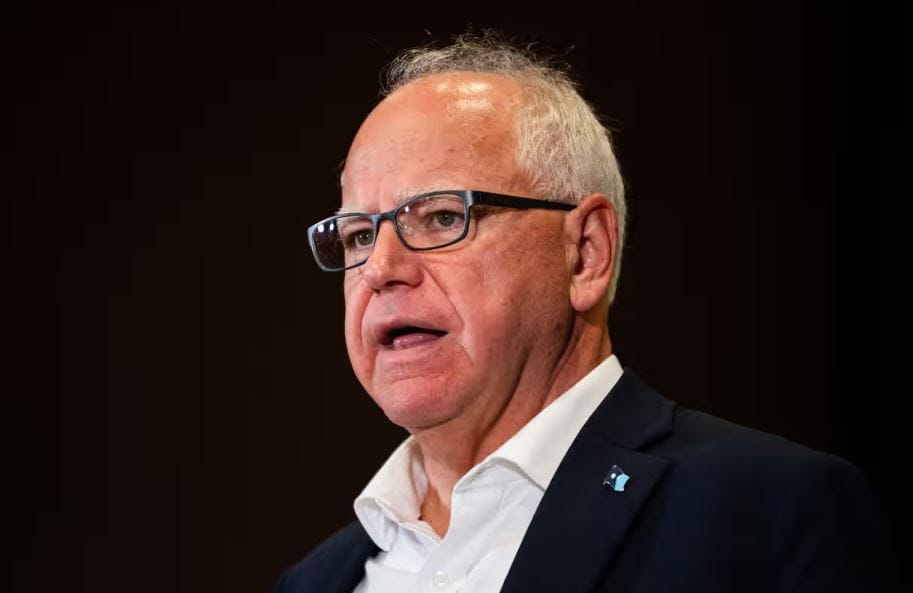Introduction: China’s Scrutiny of Walz’s Past
The selection of Minnesota Governor Tim Walz as Democratic presidential candidate Kamala Harris’s vice-presidential running mate has sparked significant scrutiny in China. Walz’s extensive history with China, including a visit coinciding with the Tiananmen Square protests of 1989, has led to speculation about his intentions and potential influence on U.S.-China relations.
Historical Context of Walz’s Connection to China
Tim Walz, who has served as Governor of Minnesota and is now a key figure in Kamala Harris’s vice-presidential bid, has long been associated with China. His initial visit to the country in 1989, the year of the Tiananmen Square protests, has drawn particular attention. The pro-democracy demonstrations in Beijing, which ended in a violent military crackdown on June 4, 1989, are a sensitive topic in China, and discussions about them are heavily censored.
Walz’s move to Foshan, a city in Guangdong Province, in 1989 to teach English at a local high school has prompted questions from Chinese social media users. His timing, which coincided with a period of significant political turmoil, has led some to speculate about his motives. Additionally, Walz’s decision to marry his wife Gwen on June 4, 1994, the fifth anniversary of the Tiananmen crackdown, has further fueled speculation.
China’s Reaction to Walz’s Political Position
Social media discussions in China have been rife with speculation about Walz’s intentions. Some users have suggested that his presence in China during a tumultuous period may have had ulterior motives, with comments questioning whether he could have been involved in espionage. This speculation reflects broader concerns about Walz’s stance on U.S.-China relations.
Despite these controversies, Walz has consistently defended his interactions with China. In a 2016 interview with Agri-Pulse, he emphasized his deep familiarity with the country, stating, “I lived in China and have been there about 30 times.” He argued that expertise on China is complex and often overstated. Walz’s positive remarks about Chinese culture and people contrast with his critical views on the Chinese government, which he has expressed in various forums.
Impact on U.S.-China Relations
The choice of Tim Walz as vice-presidential candidate has raised questions about how his past experiences might influence U.S. policy towards China. Although Walz has expressed a favorable view of Chinese culture, he has been critical of the Chinese government’s leadership. His meeting with the Dalai Lama in 2016, while serving as a U.S. Congressman, further illustrates his contentious stance with Beijing, given the Dalai Lama’s status as a controversial figure in China.
China’s Foreign Ministry has opted not to comment directly on Walz’s selection, framing it as an internal U.S. political matter. The Ministry has expressed hope for cooperative relations between the U.S. and China, despite the political turbulence surrounding Walz. Nevertheless, social media users in China remain concerned about the potential implications of Walz’s influence on Harris’s policy decisions if elected.
Future Implications and Speculations
The ongoing debates about Tim Walz’s past and his potential impact on U.S.-China relations reflect broader anxieties about the future of international diplomacy. As the U.S. presidential election approaches, the dynamics between Washington and Beijing are likely to be a focal point of discussion. Walz’s history with China and his critical stance on its government may shape perceptions of his role and influence.
Walz’s experience and views on China will be closely scrutinized, especially given the strategic importance of U.S.-China relations. His selection as a vice-presidential candidate adds a layer of complexity to the political discourse, highlighting the intersection of personal history and international policy.
Summary and Key Points
In summary, Tim Walz’s selection as Kamala Harris’s vice-presidential running mate has elicited significant scrutiny from China. His past connections with China, particularly during a politically sensitive period, have led to speculation about his motives and potential impact on U.S.-China relations. Despite his favorable comments on Chinese culture, Walz’s critical views on the Chinese government and his interactions with controversial figures like the Dalai Lama have intensified concerns about his role.
Table: Key Learning Points
| Key Point | Details |
|---|---|
| Tim Walz’s Historical Ties | Walz’s visit to China in 1989 coincided with Tiananmen Square protests, raising suspicions. |
| China’s Response | Chinese social media users question Walz’s motives and potential impact on U.S.-China relations. |
| Walz’s Stance on China | Walz has expressed admiration for Chinese culture but criticized the Chinese government. |
| Impact on U.S.-China Relations | Walz’s past and views could influence perceptions of his role in shaping U.S. policy towards China. |
| China’s Official Position | The Foreign Ministry refrains from commenting, focusing instead on the hope for cooperative relations. |
Soumya Smruti Sahoo is a seasoned journalist with extensive experience in both international and Indian news writing. With a sharp analytical mind and a dedication to uncovering the truth, Soumya has built a reputation for delivering in-depth, well-researched articles that provide readers with a clear understanding of complex global and domestic issues. Her work reflects a deep commitment to journalistic integrity, making her a trusted source for accurate and insightful news coverage.



